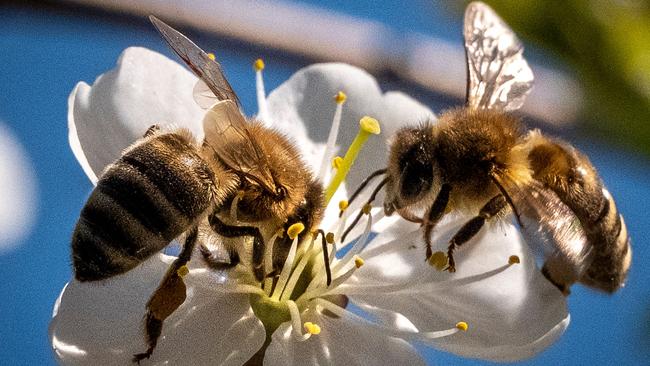We need bees to survive, but they are under threat everywhere
Bees are crucial to the survival of mankind. Without them, we would lose a huge chunk of our food supply. But they are under threat and, as a result, so are we.

If bees die, we could well die too.
Life is that simple, the science tells us.
The busy little insects pollinate most of the crops the human race relies on for its survival. Seventy of the top 100 food crops grown worldwide rely on pollinators, that’s around 90 per cent of the world’s nutrition.
So, if we lose bees, we lose.
Almonds, apples, apricots, avocados, blueberries, capsicums, cashews, coffee, cranberries, cucumbers, eggplants, grapes, kiwi fruit, mangoes, okra, peaches, pears, rockmelons, strawberries, tangerines, walnuts and watermelons.
If there are no bees, these plants cease to exist.
And bees - estimated to help produce around $170 billion in crops worldwide each year - are struggling.
Populations are plummeting.
Over the past 15 years, bee colonies have been disappearing in what is known as “colony collapse disorder”. Some regions have seen losses of up to 90 per cent, according to news reports.
What is colony collapse disorder?
It is a phenomenon discovered in the early 2000s when the majority of worker bees in a colony disappear and leave behind a queen, food reserves and younger bees.
As a result, the hive fails.
Figures show beekeepers around the world have been losing around 10-15 per cent of colonies as a result. In the US, the loss are is as high as 28 per cent.
Another threat is the varoa mite, a parasite that attacks honey bees.
Dr Anneke Veenstra, senior lecturer at Deakin University’s School of Life and Environmental Science says: “In America before 1988 there were five million hived honey bee colonies. Then the varroa mite arrived, and by 1993 that number had diminished to 2.5 million.”
Dr Veenstra says other possible reasons for the decline include the loss of flower meadows, climate change, and the use of pesticides.
The CSIRO identifies six major threats to honey bees:
• Varroa mite and other parasites and diseases
• Air pollution and water contamination
• Pesticides.
• Diet quality.
• Mismanagement of hives.
• Extreme weather events such as drought.
Pesticides are a particular concern.
We have been killing bees off in vast numbers. Maybe not deliberately, but by carelessness.
Since World War Two, the use of insecticides around the world has exploded. We are, literally, gassing to death one of the most important creatures on earth.
Neonicotinoids are some of the most harmful pesticides to bees as they function by attacking the insect’s nervous system which can lead to instantaneous death, but also bees that do survive exposure can become disoriented and forget how to find their way back to the hive – hence, colony collapse disorder.
While the bees emergency has been rolling on for several years, the UN last week called for immediate action to avoid a “global food emergency,” saying more than 820 million people are hungry, about 144 million children under the age of 5 have stunted growth, and the COVID-19 pandemic is making things worse.
Secretary-General Antonio Guterres said there is more than enough food to feed the world’s 7.8 billion people, but “our food systems are failing.”
And if bee numbers keep declining at their current rate, the problem will only get worse.
Dr Veenstrahas a dire warning.
“We could struggle to sustain the global human population,’ she says.
”If we lost all the plants that honey bees pollinate, the small animals that eat those plants will be negatively impacted resulting in fewer prey species for larger carnivorous animals and so on up the food chain.”
